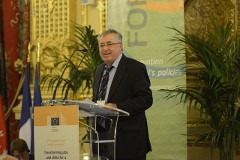Over the last decade 3 to 4.2 million jobs were created in European eco-industries. Recent studies at national level and for different sectors indicate a positive trend in employment generation coming from the transition to a resource efficient circular economy.
Green business case studies across a wide range of sectors were presented, explored and discussed in Lyon. They provided the evidence that there is a labour market shortage of employees with green skills. Skilled engineers to optimise the environmental performance of buildings or the environmental impact of mining are for example in great demand. Specialisations in electronic equipment management processes, eco-design for energy and resource savings in the construction sector, substitutions of hazardous chemicals, and innovative recycling concepts, among others, were also mentioned in Lyon as providing employment opportunities.
The European fora on eco-innovation aim at developing recommendations for policy makers. In Lyon, four key messages emerged to transform the employment potential associated with the circular economy into concrete jobs. Education was highlighted as crucial. Learning from successful examples and better connection of vocational and educational training providers with businesses shall improve the match between offer and demand of skills.
The second key message experts highlighted is the urgency in developing communication strategies with clear win-win messaging; not only to motivate consumers to demand eco-products but especially to accompany businesses to exploit the added value of resource-efficient models in the long term and thus generate employment.
A shift towards zero-waste product design needs to become mainstream. The circular economy model will generate jobs only if we redefine the way we think, produce and consume to create a positive environmental footprint with our activities. Last but certainly not least, experts highlighted the need for policy action and appropriate legislation and reform to drive change. Results-oriented policy making that transforms product manufacturing through binding legislation accompanied by tax reform was widely perceived by participants as conducive to circular economy-based models that will create employment.
Representatives of local and regional authorities were present at the forum including Alain Chabrolle, Vice-president for Health and Environment of the Rhône-Alpes region and Bruno Charles, Vice-president for Sustainable Development, Climate and Biodiversity of the Lyon urban community. Both stressed the commitment of the Rhônes-Alpes region and the City of Lyon in fostering eco-innovation as an enabler of competitiveness and growth. Rhônes-Alpes flagship project INNOV’R has deployed €15 million in investment over the past five years, giving support to over 450 projects in sustainable buildings, waste management, energy and air quality.
Karmenu Vella, EU Commissioner for Environment, Maritime Affairs and Fisheries gave the Forum’s closing remarks. ‘Rather than just balanced, the three pillars of sustainability—economic, environmental and societal—need to be integrated with each other.’ Commissioner Vella recalled that the EU still imports 60% of its raw materials. ‘New economic and business models built around resource-efficiency, eco-design and recycling are the way to go. Therefore we ought to praise the good examples while also accompany the transition for the businesses that are still following a linear model’.
The winners of the European Business Awards for the Environment 2014-2015 were announced Monday 1 December in Lyon in the context of the EcoAP forum.


